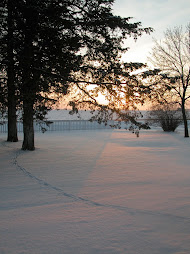
Dirt. It’s not a thing you might use words such as magnificent, eye-catching, or even beautiful to describe. In fact, dirt, when used in metaphor, is often pejorative: someone is as plain as dirt, as dumb as dirt, as dull as dirt, or as old as dirt. We can dress up dirt by calling it soil, or loam, or earth, but a rose by any other name is still … dirt.
It’s taken exactly one year for us to convert an overgrown, weed and manure-filled horse pasture into a plot of ground that is flat, smooth, rich, and clear of plant life. It’s all just dirt out there now; black, smooth, beautiful dirt!
Our first step toward vineyard establishment occurred last September when a local farmer rolled in with a tractor and mold-board plow to flip the sod. When the farmer left, the field was a bumpy mess. We let the freeze-thaw cycles that occur during a Minnesota winter break up the sod clumps and beginning late spring, we tilled, ripped, disked, and dragged the ground every few weeks. In other words, we kicked up a heck of a lot of dirt. Weeds that emerged were sprayed with a systemic, non-residual herbicide; some weeds seemed to come out of nowhere and go from green stubble to small tree in several days.
It’s taken exactly one year for us to convert an overgrown, weed and manure-filled horse pasture into a plot of ground that is flat, smooth, rich, and clear of plant life. It’s all just dirt out there now; black, smooth, beautiful dirt!
Our first step toward vineyard establishment occurred last September when a local farmer rolled in with a tractor and mold-board plow to flip the sod. When the farmer left, the field was a bumpy mess. We let the freeze-thaw cycles that occur during a Minnesota winter break up the sod clumps and beginning late spring, we tilled, ripped, disked, and dragged the ground every few weeks. In other words, we kicked up a heck of a lot of dirt. Weeds that emerged were sprayed with a systemic, non-residual herbicide; some weeds seemed to come out of nowhere and go from green stubble to small tree in several days.
The weeds didn't come from nowhere, though; they grew from our rich beautiful dirt. You’ve no doubt heard of someone who “grew like a weed.” An apt metaphor from this perspective.
Yesterday was our last day of dirt farming. Jim dragged a disk harrow up and down the field behind the ATV until the dirt was so smooth a Michigan-based pilot we know might think it's asphalt and be tempted to land his airplane on it. Jim spent so much time on the soil, in fact, that he added more than one hundred miles to the ATV odometer without leaving the vineyard!
Tomorrow, our schedule has us broadcasting five hundred pounds of grass seed on the dirt, which will become the floor of the new vineyard. Grass will choke out next year’s weed crop (much of it anyway) and allow us to get into the vineyard much more quickly after a rain. Once our new grass is sturdy enough to walk on, which should be the end of September, we’ll begin to measure and mark rows. By marking the positions of rows, end posts, line posts and turning lanes, the vineyard we’ve only been able to see with our mind’s eye will be visibly evidenced to all who regularly drive past Four Cedars Farms and may be wondering, “are they ever going to do something with all that dirt?”






